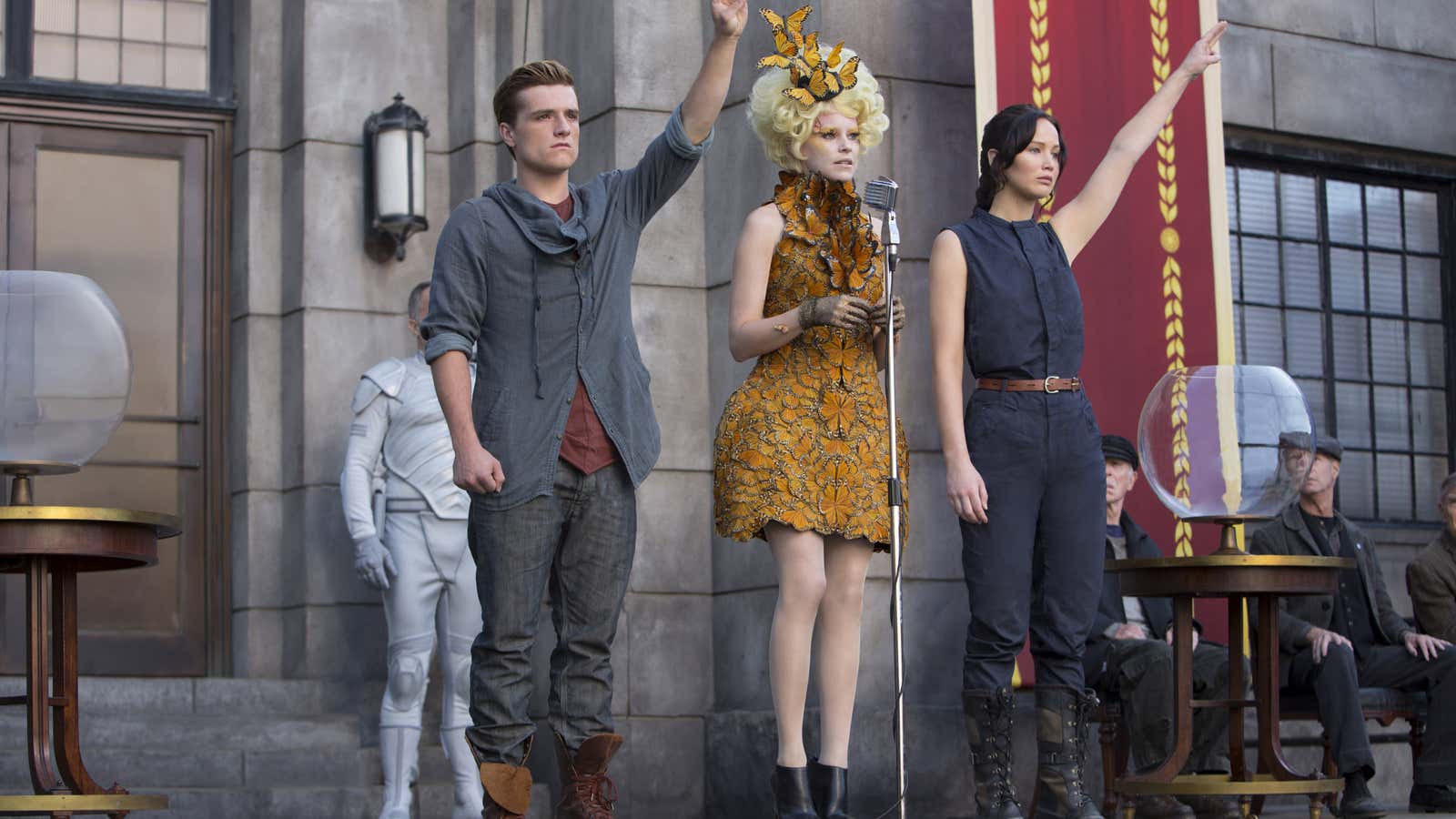I recently asked my 12-year-old cousin—the family member whose viewing tastes most closely match my own—what TV shows he’s watching. “Umm, The Flash, Arrow, Agents Of S.H.I.E.L.D., and Supergirl,” he explained. “You know, all of the superhero shows.” I didn’t say anything in the moment for fear of seeming uncool (there’s nothing more intimidating than talking to a middle schooler), but I beamed with pride at how casually he added Supergirl to his list. Much has been made about the fact that Supergirl was the first TV show in decades with a superpowered female lead. But to my cousin, the “Woman of Steel” is just another epic crime fighter.
My cousin is growing up in a world where female protagonists are becoming more and more common, not only in entertainment aimed at girls, but in the massive blockbusters historically marketed to adolescent boys. Thanks in part to Jennifer Lawrence’s turn as Katniss Everdeen, The Hunger Games series was a top 10 box office earner four years in a row. Meanwhile Star Wars: The Force Awakens positioned Daisy Ridley’s Rey as its force-wielding protagonist. And Wonder Woman is prominently featured in the trailers for Batman v. Superman: Dawn Of Justice, with her own solo film on the way. Inside Out, Divergent, and the more adult Mad Max: Fury Road also are examples of movies where the ladies are front and center (if not necessarily superheroes). In fact, 2015 was one of the best years on record for (white) female protagonists, according to The Center For The Study Of Women In Television And Film.
When critics discuss this shift, they almost always describe it as a good thing for little girls. And there’s no doubt this is true. A 2012 study showed that while watching TV increased self-esteem among white boys (who are overrepresented) it decreased self-esteem for white girls and black children of both genders (who are underrepresented).
Yet I suspect that young girls have always been better than we give them credit for at finding fictional female role models. By the time I was 12 years old, I had already fallen in love with Hermione Granger, Arwen, Dr. Beverley Crusher, and Princess Leia—awesome female role models tucked away within male-heavy properties like Harry Potter, The Lord Of The Rings, Star Trek: The Next Generation, and the original Star Wars trilogy. Plus I was always encouraged to consume media specifically aimed at girls, which has long been a haven for well-rounded, empowered female characters—from Sailor Moon to the Tamora Pierce novels, and Little Women. As awesome as they are, Katniss and Rey aren’t too different from the female role models I discovered for myself growing up. As author Mike Adamick puts it, his daughter was pretending to pilot the Millennium Falcon long before she saw a female character do so onscreen.
But the sad fact is engaging with female characters has long been optional for boys, who are specifically discouraged—by society at large if not by their own parents—from seeking out material designed “for girls.” And the female characters they do see in mainstream entertainment are more likely to be sidekicks and love interests (not to mention outnumbered by male characters three to one). Arwen stuck out to me because she shared my gender. And yet in a series full of hobbits, wizards, and warriors, I doubt she made much of an impression on those not specifically looking to see themselves represented onscreen.
And that’s what’s so cool about Rey, Katniss, and Supergirl: It’s impossible to ignore them. They are female protagonists in properties that boys are encouraged—expected, even—to watch. For the first time young boys are being asked to empathize with female leads the way girls have long been expected to empathize with male ones. After all, I may have loved Hermione, but I spent 3,000 plus pages inside Harry’s head.
And studies have shown that media has a concrete impact on how we relate to people who are different than us. As author Junot Díaz puts it, women have “spent their whole life being taught that men have a subjectivity.” Now we’re finally teaching boys a similar lesson by introducing them to female leads who are strong, smart, flawed, emotionally complex, and able to fight their own battles.
In other words, we’re raising a generation of boys who think that watching a show about a female superhero is no big deal. And that is a pretty deal in itself.
